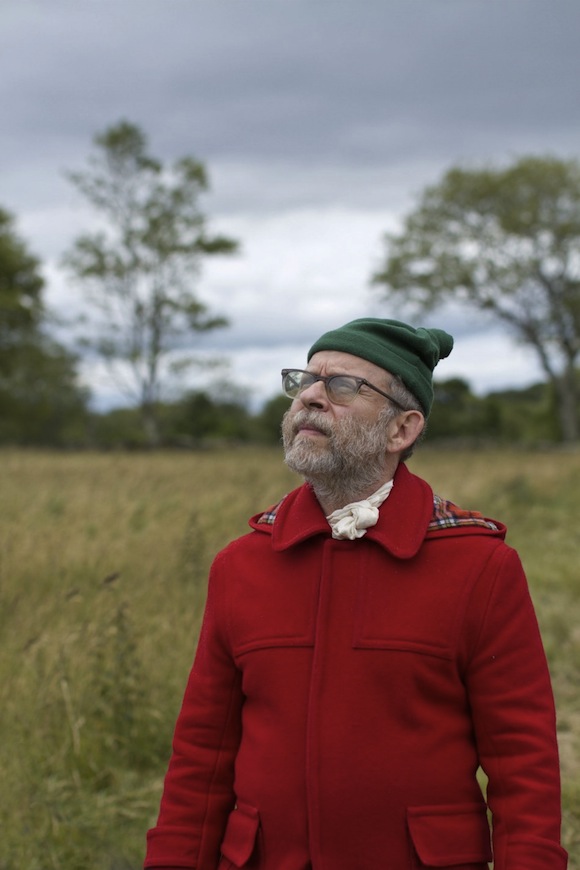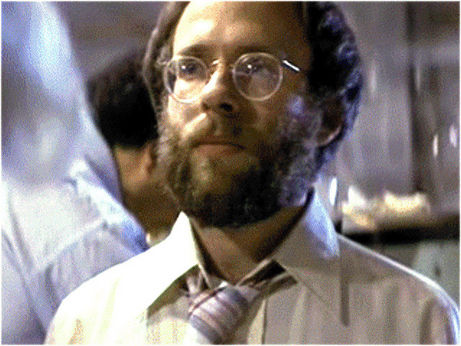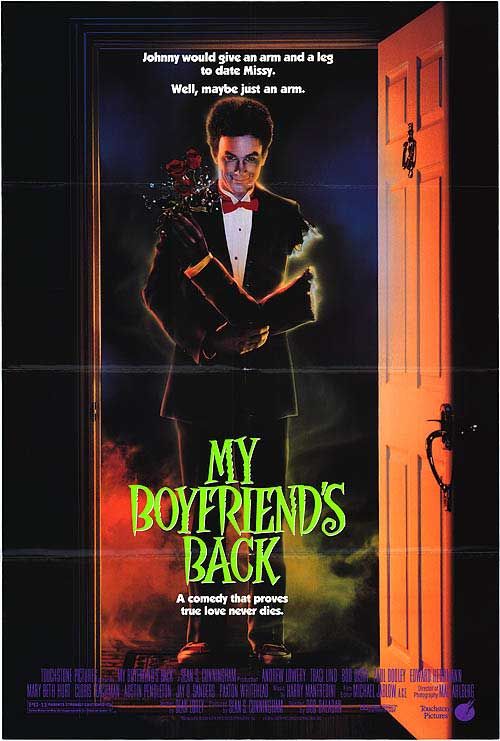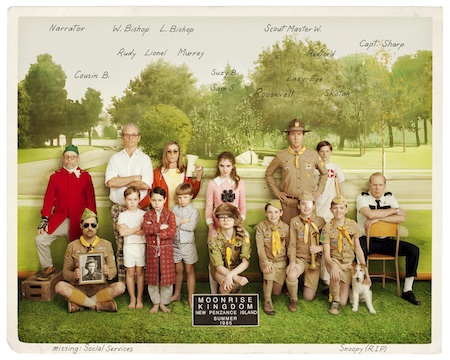Ahoy, squirts! Quint here. It was a great surprise that I got to spend some time chatting with the great Bob Balaban during my great Cannes adventure. I always wondered what project was going to get us together. The man’s one of the best working character actors and he’s had a fascinating career.
In Wes Anderson’s Moonrise Kingdom he plays the narrator, a sort of omnipotent weatherman who speaks almost solely to the audience about the setting of the story and the giant, historic devastating storm that is approaching our characters. It’s a small but crucial role, kind of the Balaban special.
We cover a lot of ground in this chat. He gives me a fantastic Close Encounters of the Third Kind story involving being mistaken for Richard Dreyfuss, discusses his directorial work and the nightmares working with the studio on My Boyfriend’s Back and quite a bit about his happiness working on Moonrise Kingdom.
When I sat down, Mr. Balaban asked where I was from. I replied “Austin” and that’s where the conversation begins. Hope you enjoy!

Bob Balaban: I really loved Austin. I directed a movie there.
Quint: Really? Which one?
Bob Balaban: It’s called MY BOYFRIEND’S BACK, a very silly movie.
Quint: I remember.
Bob Balaban: And then the first Christopher Guest movie we did in Austin, WAITING FOR GUFFMAN is in Austin, Texas. So, I’ve spent about four or five months in Austin.
Quint: It’s the only place in Texas I could call home. It’s very arty…
Bob Balaban: It ain’t Texas…
Quint: They call it “The loophole in the Bible Belt.”
Bob Balaban: I think San Antonio as well, right?
Quint: Yeah, San Antonio is really nice too, but Austin’s got it beat for food though. I’d be a svelte man if I didn’t live in Austin.
Bob Balaban: We went to the Ironworks a lot.
Quint: Yeah, that’s good BBQ. There’s a new place called Franklin. If you go back to Austin it’s really amazing.
Bob Balaban: I won’t remember the name of it now, but I was on my way to do an HBO movie called RECOUNT, you know about the Gore-Bush recount and on the way to Tallahassee, which is a capital and it’s a lot of where this stuff really took place and we were really in the real courthouse and stuff and I was down with a food critic and he said, “One of the best restaurants in the world is in Tallahassee.” Nobody had ever heard of it… They have a rather nice liquor store with mostly wine, but everything, and at night they take out tables, they bring out chafing dishes and I think they make the food at home or something and they drag it into this bar, and any wine you want you just buy it there and if it’s twenty dollars a bottle, it’s twenty dollars a bottle. They don’t add like seven hundred percent on it and it had like the best food anybody had ever had. It was in Tallahassee.
Quint: What kind of food was it?
Bob Balaban: Fine French cooking which left me out, because I sort of don’t eat too much of that, but I eat enough of it to know that it was great and it made people so happy. I love taking them there.
Quint: That’s crazy. You don’t remember the name of the place?
Bob Balaban: No, but it’s the only thing like it, so if you say that and you’re in Tallahassee, they will know exactly what it is.
Quint: That’s crazy, man. Well, it’s a pleasure to meet you. I’ve been a fan of your stuff ever since I was a little kid and I watched CLOSE ENCOUNTERS for the first time.
Bob Balaban: Thank you. Yeah, that’s exciting. I loved that.
Quint: It’s such a great film.
Bob Balaban: Well, when we did CLOSE ENCOUNTERS, when they cast me Steven said, “In this movie Richard is not wearing his glasses and he doesn’t have a beard, so you better wear glasses and have a beard, because they will think you’re Richard (if you don’t).” I mean, why? I don’t really look like Richard, but we are short Jewish people and then of course the opposite thing happened, people thought I was Richard. When they knew Richard Dreyfuss was in the movie they kind of assumed the person with the octangular glasses and the beard was the one who was in JAWS, because Richard wasn’t quite as famous then as he was a few pictures later. So there was a death threat on Richard’s life and I actually had to leave. We were in Mobile, Alabama and I had to leave for the Fourth of July, because I was so scared people would kill me.

Quint: Why was there a death threat?
Bob Balaban: Because he had made an announcement on the radio, where people didn’t get to see that he didn’t have a beard and glasses. He made an announcement how he thought it was a travesty that the Klu Klux Klan was allowed to march in the Fourth of July parade, which I think it is a travesty. I think they are terrorists and they break the law. I don’t think that you can break the law and be honored in the Fourth of July parade. So that got him in a lot of trouble, but he had five bodyguards and I had none.
Quint: (Laughs) And yet you were the decoy almost. He probably worked that out.
Bob Balaban: Anyways.
Quint: Well, congratulations on the movie.
Bob Balaban: Thank you.
Quint: I saw it yesterday and I’ve got kind of a soft spot for movies where there’s an active narrator. I have to imagine as an actor playing a role where you get to directly address the audience is something new to play with. That’s something that happens more on stage I think than in films.
Bob Balaban: Well, Our Town has the stage manager and all of the characters are sort of talking to the audience. It was exciting to be the narrator in this movie, because I knew there was a certain power in there just in the way it was designed, you know, you had their attention and you were sort of necessary. I really enjoyed it. Since I liked the writing very much it was fun to learn those things, dry though they basically seemed to be, it was really fun to do them.
Then it turned out that I even got to have a scene… I hadn’t been planning anything especially, but I did get kind of afraid of the wind and you know like what was going to happen and I kind of got involved in it. Everything is so delicate in a Wes Anderson movie, I think always. I mean, I shouldn’t say “delicate,” it makes it sound slight, but everything is sort of precarious and it would be easy to fuck it up, because the tone is so careful and yet it’s a very emotional movie. So, I tried to be very careful and not ruin things as much as I could.
Quint: And it’s an interesting character, because he’s got omnipotent powers, because he’s telling you about something that hasn’t happened yet, but he’s presented in the moments before. It’s interesting.
Bob Balaban: Well, the movie is very literate you could say and yet I don’t think it’s off putting. I think all sorts of audiences could like it. I’m really curious to see how young the demographic goes, if there are six year old kids who want to see the movie. I would think there might be, you know?
Quint: It was interesting hearing you guys talk in the press conference about how there was kind of an animated storyboard, an animatic process that he had done, because one of the things that struck me with the movie is I felt like Wes took a little bit of what he learned on FANTASTIC MR. FOX.
Bob Balaban: From the beginning I saw MR. FOX there.
Quint: Especially towards the end, there’s so much…
Bob Balaban: Kinetic energy. And in Wes’s movies there isn’t usually an adventure. I mean it’s an adventure in a way, but there’s not usually a literal adventure.
Quint: It’s a very interesting tone and the narrator plays such a key part in it and has those touches of flair himself, like the moment that you have when you turn on the light next to the camera. It’s so weird how such a small touch like makes it such a real moment.
Bob Balaban: When you have a little part in a great director’s movie you don’t really have a little part. I’m not in any way saying this about me I promise you, but… I forget right now, but this really good actress was in ROOM AT THE TOP (Hermione Baddeley). She was nominated for an Academy Award… They added it up and she had like three minutes of screen time. It’s the shortest amount of time anybody’s ever been in a movie (and been nominated), but it wouldn’t work that way on a stage. In a movie, if the director… it’s not even because a director is being kind to you, but it has the end result of a director being kind to you, directors who really know what they are doing make shots, create music, create environments in which things come alive in a very special way. You could be the best actor in the world and if your picture isn’t taken correctly or interestingly or in the right situation, you don’t exist and you can be pretty modestly meagerly talented and in the hands of a great director you can be very nicely supported by the movie.
Quint: Like you mentioned earlier on the page it might read a little dry, but I think the way Wes shot it and the way you delivered those lines. Every single time you come up it seems to mark a different point in the story…
Bob Balaban: Yeah, and it was nice. It was just enough times. It’s not too many and “Oh my God, there he is again,” but I did have a feeling when I read it that it would probably be difficult to cut my part, you know? (laughs) I would have done it anyway, but “I have a feeling I’ll end up in the movie…” We don’t always know, you know?
Quint: How many days did you shoot?
Bob Balaban: I don’t know, fifteen days maybe. Not a huge amount, but not a tiny amount. Because I was in so many locations, that’s what a movie… If this was a movie, what we were doing right now, this could be a twenty minute movie. That’s a lot of movie and we could have made it in twenty minutes, you know? But in that thing, every time I opened my mouth I had to travel somewhere, so you know it took a little longer and the weather didn’t cooperate on some days and stuff like that.
Quint: That must have been good for you too, though. I mean being in a real location can make so much of a difference.
Bob Balaban: I loved where I was. Putting my foot on that rock was like “I’m so happy to be on this rock!” And I thought the fog worked beautifully in the movie, that you had some of the movie in this gorgeous sunset with the rays of God shining down on you and then there were big patches where it was grey and foggy and mysterious. They didn’t plan that, obviously.
Quint: You mentioned earlier that the seeing the movie for the first time out here was a pretty emotional experience for you guys. How so?
Bob Balaban: I think all the actors in the movie had rather the same experience watching it, which is not common. You know, actors really when they see the movie for the first time it’s all about “How did I look? Where was the scene? Did I have lines cut?” And I think we pretty much all got much more emotionally connected to the movie than we thought we would get. I don’t think we were planning on it, we just thought we’d have a fun time and it would be a lovely, sweet movie with these kids in it and I think we were surprised at the depth of feeling that is engendered by the movie and then again corroborated by an audience in Cannes. It’s not even English speaking primarily, and it’s also an audience that’s going to opening night. They are wearing uncomfortable clothing. They’ve had an hour and half of sitting around waiting for the movie to start. While people did certainly necessary and entertaining things, but you could have seen the movie by the time the movie started it was so long.
Quint: And Cannes audiences is also notorious for being vocal if they don’t like the thing.
Bob Balaban: Yeah, they boo. It’s like the opera in Germany, it’s their territory. They own movies in France and in Cannes and they have the right to hate something and they usually do, but you did get the feeling that relatively universally in that 3,000 seat or… How many does it seat? 2,000? It’s big. You really did get the feeling that they got riveted to the movie and had a very sort of cathartic emotional experience, which is not something you expect to see in a movie that’s so meticulously put together. I have worked with directors who squish the life out of movies by being precise. It’s that yin and yang of “What’s happening now?” And in this case the precision was a wonderful support for the emotion in the movie. Sometimes it’s the opposite.
Quint: It is. It’s a very warm film and you’re right, I mean people accuse Christopher Nolan’s films of being cold and that’s kind of his approach.
Bob Balaban: It’s a mysterious thing as to why something is that way, but it’s the result of a thousand things and probably one thing, which is the director.
Quint: Was there anything that Wes did with you specifically that you kind of knew like “Okay, I’m in good hands here.”
Bob Balaban: Well I knew from saying hello, as Renee (Zellweger) said… Yeah, you knew from the beginning. He’s a wonderful communicator and he communicates in all the ways of communicating, which is if it doesn’t work for him just to lead you there gently, then he will tell you something. He can be insanely specific. “When you say this, I’d like you to take a pause here. I think this should be a little more meaningful” and also he can be “Just do whatever you’re doing.” Sometimes he said absolutely nothing, but whenever he said something, I knew what it was and it made it better and that makes you happy.
Quint: I’m sure there’s also an element of trust that develops then.
Bob Balaban: Extremely.
Quint: If you feel protected, I’m sure that you’re willing to let loose.
Bob Balaban: There is something to be said for being in movies that are directed by people like Steven Spielberg and Wes Anderson and Robert Altman and there aren’t many people like that. They are so consummately experienced and they are so talented and they are so interesting and their lives are so interesting and they know what they are doing. That comes across. You breathe it in the air and you feel it.
I don’t really think of myself as an actor particularly, I suppose I am if you had to define me as something, but I wish I were more like a real actor was, but I’m just whatever I am, because I’m stuck with that. So I do my best, but in the eight million times that I’ve been on a movie set as you get a little calmer and a little more aware and older and not necessarily wiser, but as you get more experienced… I actually enter the periphery of a movie and from the second assistant AD I can get a pretty good sense of how this thing is going. You walk into a set and you don’t have to wait for them to say “action” to know “How do people feel? How does the crew feel? How will the actors feel? What’s it like? Are you being supported? Is this an angry place?” So many things you notice instantly, like “Where did they put the craft service? And what’s on it?” It doesn’t even have to be fancy, there are so many ways you can feel this. When it’s going well, it all emanates from the director and your average commercial Hollywood movie… In some cases it does that, like in a Ridley Scott movie there’s some great kind of Hollywood kind of directors, but in your mid-level Hollywood range director there’s no feeling of anything, because a machine is running the place, a bureaucracy is running the place.
Quint: Yeah, those are the movies that feel like they are made by committee and the director is just kind of there to do what the studio execs want him or her to do.
Bob Balaban: Well, they are made by committee. Occasionally… Not often in my career, but occasionally somebody will call and say “Great, we got a job. It’s a real movie. It’s a 40 million dollar movie and you will get this and this is where your trailer will be” and I say “Well, okay I’ll read the script,” but what I don’t really want to say is “I already know this can’t possibly… If they are asking me to do this at this point from this way, I’m just a work for hire and they don’t want me to think or do anything” and then you read the script and you go “It’s not that bad. I could understand the story. It wasn’t written by a chimpanzee, but it would be so soul destroying to be having to deal with this for that amount of time” and it’s not that you want to put your stamp on it, but you want it to at least be interesting to you and you want to care about it in some way. Because I did direct a movie that I just thought was a good idea. “I should have a career. They will hire me again. I’d rather make some money and get a pension plan and my DGA pension” and I did this and when it was over… I mean it destroyed me, you know, for a while.

Quint: My Boyfriend’s Back was released in the early nineties, right?
Bob Balaban: I think so.
Quint: I can say I paid for admission. I saw that movie in the theater.
Bob Balaban: And by the way, it never would have been great, but if it hadn’t been made by the place it was made by, you could have made something kind of interesting out of it. If you cast it well and the people were fine who were in it, but all they wanted was “It shouldn’t offend anybody. No, it’s too contrasty, don’t shoot today… You can’t move the camera now, because then we can’t re-cut everything later. Why is this person wearing that hat?” It’s like, “I don’t know, I’ll just close my eyes… Let’s just shoot it and not talk anymore.” That’s not a good way to come to work.
Quint: Yeah, well it sounds like this one was a slightly better experience then.
Bob Balaban: Little bit, yeah.
Quint: Well the last question that I have is kind of an actor question. Because your character doesn’t interact with anybody except the audience, really.
Bob Balaban: I do say some things to Bill Murray and Frances McDormand and Bruce Willis (near the end of the movie), but Wes is very careful not to have me intermingle with them, so I don’t think I’m in any shots with them, you know. Since I’m the narrator it would be confusing if I came out in my full and like shook hands with somebody and they could touch the narrator, you know? I don’t really interact, but I did off screen. I was allowed to speak to the actors at lunch for example. (laughs) It could happen.
Quint: Does that change your process at all if you know that for most of your performance you’re not going to have anything or anyone to bounce off of?
Bob Balaban: Well, it means you have to memorize your lines well. (Laughs) That’s really the only thing, because nobody is stimulating you to say anything. They are little mini-monologs, but no my process isn’t that procedural. My process is “Try to get through this the best you can” and everything’s different, mostly anyways.
Quint: Well I think that’s about all I’ve got.
Bob Balaban: Thank you. It was nice to see you.
Quint: I appreciate the time.
Bob Balaban: Thank you.

I greatly enjoyed that chat. Hope you guys did, too. Now back into the fray I go!
-Eric Vespe
”Quint”
quint@aintitcool.com
Follow Me On Twitter

